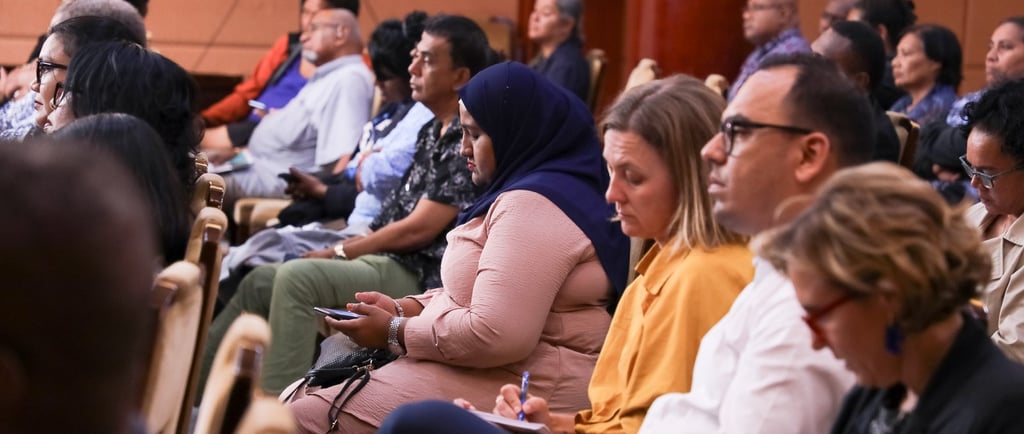Diverse Voices Shape Budget Dialogue: Citizens Engage Directly with Finance Minister
FIJI NEWS


More than 100 representatives from civil society, the private sector, diplomatic missions, government agencies, academia and grassroots communities gathered at the Suva Civic Auditorium for Dialogue Fiji’s annual People’s Dialogue on the 2025–26 Budget.
Funded by the European Union under the Democracy for All: Strengthening Inclusive Governance in Fiji (DASIG-Fiji) project, the event provided a platform for direct public engagement with the Minister for Finance, Honourable Professor Biman Prasad.
Dialogue Fiji Executive Director, Mr. Nilesh Lal, opened the event by underlining the budget’s importance to democratic governance. “It is vital that the national budget is not merely presented but interrogated, debated and understood by the people it ultimately affects,” he said.
In his keynote address, Prof. Prasad outlined three core priorities of the coalition government’s third consecutive budget: tackling infrastructure deficits, easing cost-of-living pressures by reducing VAT to 12.5 per cent, and preparing for global economic headwinds. He cited progress from previous budgets, including the reduction of the fiscal deficit from 7% to 3.6% of GDP and a drop in debt-to-GDP from 90% to 76%. He defended the decision to run a higher deficit this year to fund critical infrastructure and social support.
A four-member panel discussion, moderated by Dr. Shailendra Singh of the University of the South Pacific, followed the address.
Edward Bernard, CEO of the Fiji Commerce & Employers Federation, commended the budget’s predictability and called for more support for local manufacturers and better use of the 1% tertiary-education levy for workforce development.
Vani Catanasiga, Executive Director of the Fiji Council of Social Services, highlighted citizen tools like the Kacivaka scorecard and community feedback mechanisms to enhance transparency and accountability. She urged swift parliamentary action on the Access to Information Act.
Golden Manufacturers Group CEO Ram Bajekal described the budget as “hoping for the best, preparing for the worst.” He emphasized renewable energy, reducing port congestion, and protecting local industries through balanced tariffs.
From Bua Province, grassroots leader Mereoni Taginadavui shared emotional accounts of delayed maternal and cancer care due to poor rural infrastructure and called for better maritime jetties and more inclusion of women in decision-making.
During the open Q&A, citizens raised concerns over nursing pay, local food tax exemptions, regional development, funding for minority groups, and the rise of artificial intelligence. Prof. Prasad and his team committed to reviewing policy bottlenecks, fast-tracking reforms, and mobilising more resources.
The evening wrapped up with an awards ceremony for Dialogue Fiji’s video and art competition on women’s political participation. First place went to Nandini Kaushal (FJD 1,000), followed by Penaia Nawaqabuli (FJD 500) and Simran Kamal (FJD 250).
In closing, Mr. Lal thanked the European Union, panellists and participants. “Tonight’s dialogue underlines the power of inclusive debate. As we move forward, let us remain vigilant in scrutinising fiscal policy and ensuring it serves every Fijian,” he said.